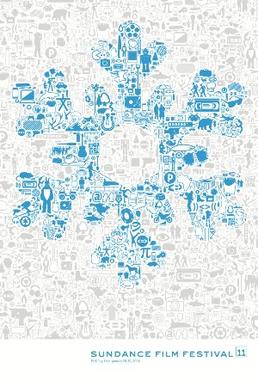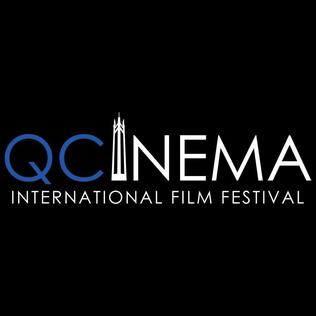Related Research Articles

David James Stratton is an English-Australian award-winning film critic, as both a journalist and interviewer, film historian, educator, television personality, and producer. His career as a film critic, writer, and educator in Australia spanned 57 years, until his retirement in December 2023. He co-presented film review shows on television with Margaret Pomeranz for 28 years, wrote film reviews for The Weekend Australian for 33 years, and lectured in film history for 35 years.
The Melbourne International Film Festival (MIFF) is an annual film festival held over three weeks in Melbourne, Victoria, Australia. It was founded in 1952 and is one of the oldest film festivals in the world following the founding of the Venice Film Festival in 1932, Cannes Film Festival in 1939 and Berlin Film Festival in 1951.

The Edinburgh International Film Festival (EIFF), established in 1947, is the world's oldest continually running film festival. EIFF presents both UK and international films, in all genres and lengths. It also presents themed retrospectives and other specialized programming strands.

Picturehouse Cinemas is a network of cinemas in the United Kingdom, operated by Picturehouse Cinemas Ltd and owned by Cineworld. The company runs its own film distribution arm, Picturehouse Entertainment, which has released acclaimed films such as David Lowery's A Ghost Story, Sally Potter's The Party and Francis Lee's God's Own Country, Custody, Capernaum and The Wife. A previous iteration of this distribution arm, which focused largely on alternative content, was sold in 2017 to Howard Panter and Rosemary Squire and rebranded as Trafalgar Releasing.

The Adelaide Film Festival is a film festival usually held for two weeks in mid-October in cinemas in Adelaide, South Australia. Originally presented biennially in March from 2003, since 2013 AFF has been held in October. Subject to funding, the festival has staged full or briefer events in alternating years; some form of event has taken place every year since 2015. From 2022 it takes place annually. It has a strong focus on local South Australian and Australian produced content, with the Adelaide Film Festival Investment Fund (AFFIF) established to fund investment in Australian films.

Picturehouse is an American independent entertainment company owned by CEO Bob Berney and COO Jeanne R. Berney. Based in Los Angeles, the company specializes in film marketing and distribution, both in the U.S. and internationally. Its releases have included La Vie en Rose (2007), which earned an Academy Award for Best Actress for Marion Cotillard, Metallica Through the Never (2013), and Adam Wingard's Sundance Film Festival selection The Guest (2014), an Independent Spirit Award nominee starring Dan Stevens.

The BFI London Film Festival is an annual film festival held in London, England in collaboration with the British Film Institute. The festival runs for two weeks in October every year. In 2016, the BFI estimated that around 240 feature films and 150 short films from more than 70 countries are screened at the festival each year.

The Australian Film Commission (AFC) was an Australian government agency was founded in 1975 with a mandate to promote the creation and distribution of films in Australia as well as to preserve the country's film history. It also had a production arm responsible for production and commissioning of films for the government. It was superseded by Screen Australia from 1 July 2008.

The cinema of Lebanon, according to film critic and historian Roy Armes, is the only other cinema in the Arabic-speaking region, beside Egypt's, that could amount to a national cinema. Cinema in Lebanon has been in existence since the 1920s, and the country has produced more than 500 films.

The Berlin International Film Festival, usually called the Berlinale, is a major international film festival held annually in Berlin, Germany. Founded in 1951 and originally run in June, the festival has been held every February since 1978 and is one of Europe's "Big Three" film festivals alongside the Venice Film Festival held in Italy and the Cannes Film Festival held in France. Furthermore, it is one of the "Big Five", the most prestigious film festivals in the world. The festival regularly draws tens of thousands of visitors each year.

The Sundance Film Festival is an annual film festival organized by the Sundance Institute. It is the largest independent film festival in the United States, with more than 46,660 attending in 2016. It takes place each January in Park City, Utah; Salt Lake City, Utah; and at the Sundance Resort, and acts as a showcase for new work from American and international independent filmmakers. The festival consists of competitive sections for American and international dramatic and documentary films, both feature films and short films, and a group of out-of-competition sections, including NEXT, New Frontier, Spotlight, Midnight, Sundance Kids, From the Collection, Premieres, and Documentary Premieres. Many films premiering at Sundance have gone on to be nominated and win Oscars such as Best Picture, Best Director and Best Actor in a Leading Role.

The Barbican Centre is a performing arts centre in the Barbican Estate of the City of London, England, and the largest of its kind in Europe. The centre hosts classical and contemporary music concerts, theatre performances, film screenings and art exhibitions. It also houses a library, three restaurants, and a conservatory. The Barbican Centre is a member of the Global Cultural Districts Network.

The UK Jewish Film Festival is an annual film festival dedicated to world cinema that explores Jewish life, history and culture worldwide. It was founded in 1997 and takes place in November, in London and in other cities in the United Kingdom.

The 27th annual Sundance Film Festival took place from January 20, 2011 until January 30, 2011 in Park City, Utah, with screenings in Salt Lake City, Utah, Ogden, Utah, and Sundance, Utah.
Luke Seomore is an English film director, and musician, part of a critically acclaimed filmmaking duo working alongside English director Joseph Bull. He often performs and writes under the moniker ‘Blessed are the Hearts that Bend'. Seomore's work includes music videos, Feature films, television and art installations. They write and direct their films together, while Seomore composes original soundtracks. Their debut feature Blood Cells premiered at 71st Venice International Film Festival in 2014.
Mercury CX, formerly Media Resource Centre (MRC), is a not-for-profit film and television training organisation based in the Lion Arts Centre on the corner of Morphett Street and North Terrace, Adelaide, South Australia, which aims to give screening opportunities to emerging South Australian film, video and digital media artists. It also manages the not-for-profit Mercury Cinema, which shows films by subscription to the Adelaide Cinémathèque film society, screening classic or notable films and hosts film festivals and other events. Mercury CX hosts the Screenmakers Conference and the South Australian Screen Awards.
The Aesthetica Short Film Festival (ASFF) is an international film festival which takes place annually in York, England, at the beginning of November. Founded in 2011, it is a celebration of independent film from around the world, and an outlet for supporting and championing filmmaking.
The Smalls Film Festival is an independent film festival which takes place annually in London. Founded in 2006, the festival is one of the UK's major short film festivals, featuring an international programme of short films, talks, panels, discussions and workshops. The festival has had many collaborative partners including BAFTA, Creative Review, Devilfish, UKTV, Panavision, and the London Design Festival.

Flickerfest is an international short film festival held annually in January at Bondi Beach, Sydney. It is an Academy and BAFTA recognised short film festival for both international and Australian film makers.

The QCinema International Film Festival is an annual film festival held in Quezon City, Philippines. The festival showcases local and international films, documentaries, and short films, and gives grants to their creators. As of 2017, the venues for the festival are Trinoma, Gateway Mall, Robinsons Galleria, and U.P. Town Center.
References
- ↑ "Australian film and television chronology: the 1990s". Australian Screen Online . National Film and Sound Archive. 29 May 1991. Retrieved 22 January 2024.
- ↑ "Australian hit parade in London" . The Age . 6 March 2003. Retrieved 22 January 2024.
- ↑ "Shades of Australia light up the silver screen" . The Age . 14 March 2003. Retrieved 22 January 2024.
- ↑ "The London Australian Film Festival At The Barbican". Australian Film Commission (archived). Screen Australia. Archived from the original on 21 March 2019.
- ↑ Wilkinson, Amber (15 March 2009). "Eye For Film: Australian Film Festival preview, plus Richard Brennan and Jasmine Yuen-Carrucan talk about film Down Under". Eye For Film. Retrieved 22 January 2024.
- ↑ Coghlan, Alexandra (15 March 2010). "London Australian Film Festival: Beyond the Cultural Cringe". The Arts Desk. Retrieved 22 January 2024.
- ↑ "Little Sparrows selected for London Australian Film Festival". IF Magazine. 18 April 2011. Retrieved 22 January 2024.
- ↑ "About the festival". Barbican. Archived from the original on 24 May 2015.
- ↑ "LAF Film Festival". London Australian Film Society. 24 September 2023. Retrieved 22 January 2024.
- ↑ "About London Australian Film Society". London Australian Film Society. 20 July 1973. Retrieved 22 January 2024.